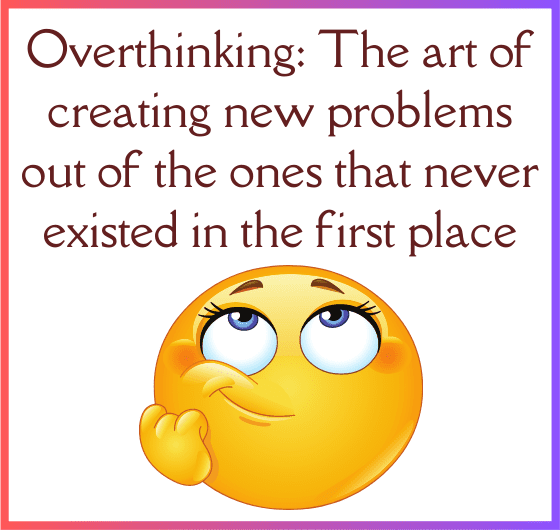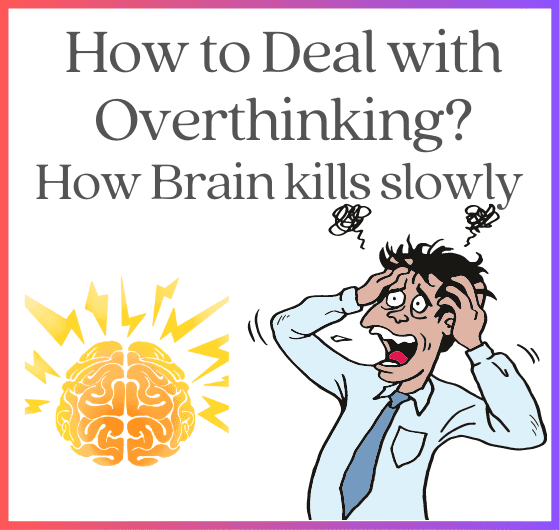Thinking too much leads to paralysis by analysis. It’s important to think things through, but many uses thinking as a means of avoiding action. –Robert Herjavek
What is Overthinking?
Overthinking means that your mind is locked onto single or multiple topics at once. Most often it’s something negative, and it won’t let go easily.
Overthinking often involves ruminating about the past and worrying about the future. Forbes
Overthinking involves dwelling on the problem.
The classic overthinking definition is, “to think about something too much or for too long.”
We all experience events that cause us to worry or stress and the fact is that we can’t stop them.
“Sometimes the worst place to be is in your own head”
What will happen when you overthink?
>> You obsess on a topic and that obsession will eventually become a very good reason for your mental breakdown.
>> You will feel stuck on a topic as it will take hold of your head, and this is because of repeating the negative outcomes of a situation in your mind, without taking any real action on it.
>> It consumes your energy and decreases your ability to make decisions. It also increases your likelihood of experiencing anxiety and worries over the task at hand.
Each one of us wants to live life on our own terms. We all desire power. Everyone wants to control the other. So, sometimes we also overthink in an attempt to change the past or control the future. But alas, both these attempts are futile.
Obsessive ruminating about the past and the future morphs into the feelings of
- Worry
- Guilt,
- Regret,
- Shame, and distress.

“You can spend minutes, hours, days, weeks, and months overthinking the past. Trying to put together pieces, imagining what could’ve been, should’ve been, or would’ve been. Or you can pick up the pieces off the floor and move on as a stronger, smarter person. — Nicolas Sparks
When are you overthinking?
Signs that you are Overthinking Right Now:
>> Imagine that you are about to sleep. You have had a long day at work, eat your dinner, over with the TV news updates, and finished with all your daily chores. Now it’s time for bed and do some reading. After some time, you realize that it’s getting too late and decide to finally sleep. You reach over and turn off the light. It’s pitch dark now.
You know you should be falling asleep, and yet the only thing you can do is, stare at the ceiling. Your mind is racing with all sorts of thoughts.
You start thinking about an argument in the office. Remembering those harsh blows of words from both sides which had left you heartbroken. Now, after some time, you feel guilty and there falls a tear from your eyes. Again, you think back to something you said and wonder if things came out wrong.
You dwell on your past actions that may have resulted in negative outcomes, and you start to worry about all the things that could have possibly gone wrong. With each passing thought, you feel yourself sinking into the lowest of moods.
If this sounds like you, you may be suffering from overthinking.
“Overthinking: The art of creating new problems out of the ones that never existed in the first place”
Signs that You are Overthinking:
1. You will ask everyone you know for advice even in simple matters.
2. You feel completely stuck in a situation and unable to take any action on it.
3. You obsess over the worst possible outcome and can’t think about a good solution.
“Overthinking can absolutely consume us”
Bonus tips| Breaking free from Overthinking.
>> If you find yourself obsessing over the same thoughts, try mindfulness meditation. It will control your brain waves and help you break out of this confusion pattern.
>> You will eventually find that when you separate yourself from your thoughts a bit, it becomes actually easier to make a decision.
4. You feel terrified that you will make the wrong choice again and as a result, you fail to take any action.
If there is an important decision in front of you during overthinking, you will drown yourself in all possible “what-if” scenarios that can feel so overwhelming, you would do nothing, fail to take any action, and avoid it altogether.
>> Moreover, Overthinking causes your mind to feel cloudy and unclear. It may feel impossible to find a good solution because now you will be surrounded by so many different outcomes.
5. You start doubting yourself in all the other aspects of your life.
For example, There was a time when I was struggling to choose my wedding venue. I noticed that I was also having a hard time making smaller everyday decisions, too.
Choosing things like what to wear for office, what to eat for dinner, or what station to watch on television, became difficult to decide. This happened because I was in the habit of doubting myself. I had started to consider myself a failure. Not to mention, I was spending so much time overthinking the venue, I didn’t have the mental space to think of anything else. Hope you get the point.
i.e. My mind was preoccupied with my obsessive thoughts about choosing the wedding venue, and I was unable to process any other information.

6. You will feel mentally and emotionally exhausted.
Your brain gets tired when processing thoughts. When you fire your brain with a constant stream of very strong obsessive thoughts, fairly large amounts of energy will be required by your brain to process them.
The brain gets very tired, and you will feel drained and will get mentally and emotionally exhausted. You may feel burnt out, tired, and unable to do the things you normally enjoy doing.
7. You constantly think about the worst-case scenario.
You will always overthink a potent negative thought. The situation may be any, you always have the tendency to hold on to the worst possible outcome.
For example. A situation has 300 possible outcomes. And just one of them is scary and negative. There is a possibility that you will hold on to that one negative outcome and forget about all other 299 good ones. This way you are creating more anxiety for yourself.
8. You will be losing sleep at night, and experiencing insomnia and if the situation gets worse then maybe hallucinations take over.
9. You are making tons of “pros” and “cons” lists.
During the confusion, you will do self-talk trying to find a viable solution to the problem at hand. Then you will start making a “to-do” list of do’s and don’ts, to stop yourself from making any mistake again.
But you fail to realize that analyzing the above list will throw you into a more confusing, mind-boggling “Guilt-Trap”
“Stop overthinking, you are only creating problems that aren’t there.”
Before you can change your focus to a problem-solving ability, you have to become aware of when you’re overthinking.
“Overthinking is a potent cause of unhappiness.”
Here are 14 warning signals that you are in overthinking mode:
1. I can’t stop worrying.
2. I often worry about situations that may never occur in my lifetime.
3. I am constantly thinking of my past mistakes.
4. I re-live all the embarrassing moments of my life, in my mind, over and over and over again.
5. I often obsess myself with “what if…” questions.
6. I am having difficulty in sleeping because it feels like my thoughts will never stop.
7. I am having a very strong headache and it feels like my head is going to explode.
8. When I think of my past, I always regret my words and actions that should not have been said and done respectively.
9. Whenever I sit alone, I am always filled with infinite guilt.
10. I spend a lot of free time pondering over any harsh words, people may have said.
11. I spend loads of time and energy scrolling my feed on every social media account.
12. I spend a lot of time either dwelling on past events or worrying about the future that I often miss what’s going on in the present.
13. I feel it is very difficult to maintain my focus on any task at hand.
14. I feel alone, scared, along with a loss of hope and happiness in life.
“Overthinking comes into play when you need to make a tough decision in life or are dealing with your insecurities. If overthinking is not a symptom of a deeper emotional issue, it can often be addressed by changing thoughts and mindsets” Tony Robbins
“I’ve got thoughts more tangled than my headphones”

Why overthinking is bad?
“Overthinking can adversely affect your living and your experience with the outside world”
>> Overthinking will stop you from making important decisions.
>> Prevent you from enjoying the present moment plus draining you of the energy you need to handle daily stressors,” explains Dr. Fowler.
>> Confuse you every time when making an important decision in life, and in a way hinder your growth mode.
You are most likely to develop “Destructive thought patterns”.
You may be dwelling on your past or maybe obsessing about your future, the destructive thought patterns can take a toll on both your mental health and physical health.
“Studies show that ruminating on stressful events can, over time, lead to anxiety and depression,” warns Dr. Fowler.
From a mental health point of view, anxiety can:
>> Make you more vulnerable to everyday stress, and
>> The depression will result in sadness, loneliness, and feelings of emptiness.”
Anxiety and depression are accompanied by symptoms such as:
- Strong Headaches.
- Fatigue all day.
- Nausea accompanied by vomit.
- Difficulty in concentrating.
- Lost Focus.
- Trouble sleeping continuously.
- Unhealthy changes in everyday appetite.
Anxiety disorder is also linked to:
>> High blood pressure and
>> Poor cardiovascular health.
Depression can increase your risk of heart attack and suicide attempts,” warns Dr. Fowler.
Now that you know how to tell if you’re overthinking and why it’s bad, it’s time to design your action plan for stopping this dangerous and deadly habit.
“Overthinking is often the product of underdoing” Y. Berg
Learning to deal with overthinking: Empowering Strategies for Mental Clarity.
Crispy conclusion:
1. Take a step back, Take a knee, and then think about the solution to that problem.
2. Then take action.
3. Question the authenticity of your thoughts.
4. Re-think your life’s goals.
5. Understand your triggers.
6. Be mindful of your reaction, and try to find your passion for the solution.
7. Distract yourself with a hobby or an activity you love doing.
8. Focus on your breathing and bring all the attention to “Now”.
9. Practice self-love and acknowledge your achievements.
10. Work on enhancing your self-esteem
11. Train your mind to always be solution-oriented.
12. Keep a list of your achievements and go through them more often.
13. Always remember to appreciate your achievements.
14. You can also try Mindfulness meditation.
We cannot solve our problems with the same thinking we used when we created them. — Albert Einstein

Let’s learn to deal with Overthinking, in detail:
1. Question your beliefs.
Overthinking ruins friendships and relationships. Overthinking creates problems you never had. Don’t overthink, just overflow with good vibes— Anonymous
Find out what will drive your emotional response. It might be an embarrassing moment, a mental weakness about yourself, or worry that you will always end up in a very troublesome situation. You will soon drown in such thoughts for no reason. And once they start, it’s very difficult to turn them off.
Thanks to your wonderful obsessive mindset!
>> It’s all about the mindset that you may have developed in all these past years.
For instance, you may be extremely embarrassed about a past event, but to others (Family or friends), it’s a possibility that they either barely remember it or they don’t care at all.
So you don’t have to live with the guilt forever. Leave it and Let go. That is why perspective matters a lot.
>> The other possibility is that maybe you always believed that you were incapable of doing any serious work. You see your friends achieving something and then tell yourself “that’s just not me, that can’t be me”. With these thoughts in mind, you won’t be able to build enough motivation and accomplish that task passionately. You will put only half-hearted effort or no effort at all.
2. Turn your thoughts into action.
Thinking will not overcome fear but action will.— Clement Stone
While thinking of a solution to a problem, you will have many action plans. But overthinking will make you its puppet, and won’t let you execute any action.
Slowly, you will find yourself drowning in a pool of “repelling negative thoughts”.
The only way out is that you start taking action as soon as any valid plan strikes your mind. Because performed actions will minify your thought process and stop the brain drain here.
We overthink because we have a belief that simply thinking about a problem will create a solution for it. It’s a belief that repeating the same outcome in mind will somehow lead us to a bright conclusion. But it all happens the other way around. Obsessively ruminating the same negative thoughts often results in the manifestation of a negative reality, it won’t make things better, rather elevate the stress and anxiety.
Overthinking keeps us struggling in the same loop.
>> We feel trapped like a frog in the well, if we stay in the same mental spot.
>> Also, when you fix your focus on one thing, you become blinded to any other possibilities out there.
The way out here is to fix your brain into finding a solution. Just correct your mindset and your life will be in better control. Whenever you encounter any problem, instead of worrying that why it happened or complaining about it, tell yourself, “What can I do about it?”
Bonus Tips:
>> Focus on what is within your power, focus on your reach.
>> Promise yourself that you will do better in the future.
>> Show gratitude for the lessons gained, in the course of finding a solution.
You can spend minutes, hours, days, weeks, and months overthinking the past. Trying to put together pieces, imagining what could’ve been, should’ve been, or would’ve been. Or you can pick up the pieces off the floor and move on as a stronger, smarter person — Nicolas Sparks
3. Focus on the present.
“Where focus goes, energy flows”
>> Your everyday energy is a finite resource.
>> If you focus on distraction, you will learn distraction.
>> Focusing on overthinking will increase your worry.
If you change your focus in the present, you will:
>> Become more practical,
>> Be more responsible,
Cultivate a mindset that is more solution-oriented.
4. Act Differently to Think Differently:
Forgive the past. It is over. Learn from it and let go. People are constantly changing and growing. Do not cling to a limited, disconnected, negative image of a person in the past. See that person now. Your relationship is always alive and changing. — Brian L. Weiss
Thoughts give –> Emotions result in–> Reaction –> Actions –>Repeated actions become character.
As we can see above, our actions are a product of our thoughts, which is also true the other way around. i.e. Our Thoughts can be a result of our actions.
Whenever worry takes over:
>> Start working on a hobby or anything you love to do.
>> You can paint, draw on paper, cook something or
>> Soothe yourself with a refreshing cup of green tea.
>> You can even tidy your sheets or read an interesting book.
>> Just start doing something to help your mind “Think straight”.
This will soothe your soul and remove worry and anxiety from your life instantly.
You can try journaling out your thoughts.
Sometimes we get so stuck in our minds that our thought process gets jammed. But, when we write our thoughts, we just might find the answer coming to us.

5. Step back and look at how you’re responding
Your character will define the way you respond to your thoughts. If you have a habit of obsession, it will be difficult to stop the repetitive thinking. Take note of how it affects your mood. Do you feel irritated, nervous, or guilty? What’s the primary emotion behind your thoughts?
Step back àmonitor your thought process àNotice your reaction àtry judging your actions with a positive mindset àcorrect if necessary à take required action. (Protect your thoughts).
6. Find a positive distraction
Fight “Overthinking” by involving yourself in some Joyous acts.
This could be different for everyone, but here are some ideas:
>> Learning new kitchen skills by making a new recipe.
>> Hitting the gym.
>> Starting with a new hobby, such as painting.
>> Pamper yourself with a soothing drink.
>> Becoming a volunteer with a local organization.
Do breathing exercises:
This will improve your oxygen levels in the body and help you live better.
1. Find a comfortable place to sit.
2. Relax your neck and shoulder muscles.
3. Place your hands across your belly.
4. Inhale and exhale deeply through your nose, paying complete attention to how your chest and stomach move as you breathe.
Try doing this exercise three times a day for 10 minutes, or whenever you have mind-boggling thoughts.
7. Meditate
“We suffer more often in imagination than in reality.” Seneca
All you need is a silent space and a quiet spot. Scientifically proven benefits of meditation include:
>> Decreased anxiety levels.
>> Lowers depression.
>> Increase tolerance to pain.
>> Improved learning and higher memory capacity.
>> Higher state of self-awareness.
>> Better focus on goals.
>> Higher “alpha” waves — resulting in lower levels of sadness, anger, fear, and rage.
>> Balanced blood pressure.
>> Stronger immune system.
Look at the bigger picture and focus on the solution.
>> Visualize what you want àLive the final result again and again in your mind àthen connect the dots backward.
>> Do something nice for someone else.
The ultimate purpose of a human being is to be helpful to someone, to serve others, and to be meaningful to someone in need.
If you pursue this divine purpose, your thoughts will align with the vibes of the universe and your mind will experience the bliss in servitude.
Trying to be useful to someone, and sharing his burden, will ease your mind. Find ways in which you can be of service to someone going through a difficult time and then take action on it.
“if you make your life meaningful to others, you will never feel lonely again”
—Manish Chaudhary
8. Acknowledge your successes
As Napoleon Hill, author of Think and Grow Rich, writes:
“Fear can be effectively cured by forced repetition of acts of courage.”
If you feel you are overthinking then:
> Take a step back –> Take a knee(relax)–> Hold that list of your achievements –> Read them àthen visualize them in your mind –>Appreciate yourself for the eureka moment.
You will feel confident and start feeling good about yourself.
Your accomplishments might not be very big. Small acts of kindness you may have done today or kind words spoken, that made someone feel good and uplifted, will work.
Sometimes, you overthink things so much that you ruin something before it even begins, then you beat yourself up, replaying everything to your friends and in your mind.
— Kirsten Corley
9. Give your power and energy to solutions.
“To stop overthinking, you must address the problems at hand. When you feel overwhelmed, take some time to write down all your thoughts in your head, but then shift your attention to the solutions”.
10. Live in the present moment.
>> Be mindful of everything you do or come across. Do not distract yourself by continuously scrolling your social media feed.
Maintain your family relationships (those matter the most), greet them and seek their blessings whenever the time comes. Be present when need be.
A few ideas to live in the present are:
>> Spend time pursuing a hobby i.e. Focus on a single activity for some fixed time.
>> Unplug all electronic devices: In the morning, just before starting work, or maybe at night, designate a fixed time when all your devices will be switched off and it will be a distraction-free zone around you.
Go for a walk outside. Dissolve your thoughts with nature, think about the “simplicity in complexity” of this divine universe.
“Be mindful and feel how lucky you are to have these thoughts in mind”

11. Practice self-love, and appreciate your successes.
Here are some ways Practice-self love:
>> Wake up early to access the Positive, Powerful, and Devine powers of the Infinite Intelligence (GOD).
>> Meditate every morning to motivate and charge up your powerhouse (your mind).
>> Breathe fresh air deeply >give yourself more energy>Improved healing>Higher mental Focus.
>> Prioritize your needs.
>> Stop comparing yourself to others.
>> Look at the mirror and learn to love your body.
>> Do one thing at a time and stop rushing through tasks.
>> Unfollow social accounts that set unrealistic expectations.
>> Set healthy boundaries in relationships.
>> Exercise regularly to feel good.
>> Find a passion or pursue a hobby.
>> Ask for help whenever you need to.
>> Normalize saying no.
Remember that just because you’re having a tough time in one area of your life doesn’t mean you’re incapable of decision-making in other areas.
>> Take a Nap: Your obsessive thoughts will die off, and you will feel fresh and be supercharged to take up the next assignment.
>> Write Down your thoughts: This habit will change your focus on the hand-written points. You will choose not to get distracted by any means and then you become more solution-oriented.
12. Embrace your fears
It is impossible that you solve every problem, things will get out of your control. You will make mistakes, you will live and learn, after all, you are a sweet human being.
Your understanding to accept the above scenario can go a long way toward curbing overthinking.
Maybe, if you get easily scared by your fears, this attitude will confuse you, make you overthink the situation, and at worst could drive you crazy. But don’t despair, always hold your ground, and face your fears head-on.
This habit will give you enough confidence to make your own choices and take correct decisions.
Your attitude will be “think less and work more”.
You will be preoccupied and there will be no time to even think of the unwanted possibilities.
Take Action to Stop Overthinking| Final Words
Certainly! Here’s a simplified and easy-to-read version of the bullet points on the topic “Take Action to Stop Overthinking | Final Words”:
1.. Understand that overthinking will harm your well-being and productivity.
2. Overthinking rarely solves problems and increases stress and anxiety.
3. Practice mindfulness to catch yourself when you overthink.
4. Replace negative thoughts with positive and constructive ones.
5. Engage in activities or hobbies that distract you from overthinking.
6. Set achievable goals and prioritize tasks to avoid feeling overwhelmed.
7. Try relaxation techniques like deep breathing or meditation to calm your mind.
8. Seek support from trusted friends, family, or a therapist for guidance.
9. Limit exposure to triggers like social media or news that fuel overthinking.
10. Be kind to yourself and foster positive self-talk.
Taking action against overthinking can lead to a more balanced and fulfilling life. Remember to keep it simple and focus on progress, not perfection.
Interesting facts about overthinking that are highly searched and have low competition:
1.. Overthinking is linked to increased stress levels: Research has shown that overthinking can lead to heightened stress levels, as excessive rumination and worry can activate the body’s stress response.
2. Overthinking can negatively impact decision-making: Overthinkers tend to struggle with making decisions, as they often get caught up in analyzing every possible outcome and scenario, leading to decision paralysis.
3. Overthinking is associated with decreased problem-solving abilities: While deep thinking can be helpful in problem-solving, overthinking can hinder the process. Overthinkers often get stuck in repetitive thoughts and struggle to find effective solutions.
4. Overthinking is connected to poor sleep quality: Overactive minds can make it difficult to relax and fall asleep. Overthinkers often experience racing thoughts and find it challenging to quiet their minds, leading to disrupted sleep patterns.
5. Overthinking can lead to negative self-talk and self-doubt: Overthinkers tend to engage in negative self-talk and self-criticism. They often second-guess themselves, which can erode self-confidence and create a cycle of self-doubt.
6. Overthinking can contribute to mental health issues: Prolonged and excessive overthinking can increase the risk of developing or exacerbating mental health conditions, such as anxiety and depression.
Few fun facts about overthinking that are highly searched and have low competition:
1.. Overthinking is like a mental treadmill: Just like running on a treadmill gets you nowhere physically, overthinking keeps your mind stuck in the same place without making any progress.
2. Overthinking can be contagious: Being around someone who overthinks a lot can make you more prone to overthinking yourself. It’s important to surround yourself with positive and balanced thinkers.
3. Overthinking often involves creating hypothetical scenarios: Overthinkers tend to imagine different scenarios and outcomes, even ones that are unlikely to happen. It’s their mind’s way of trying to prepare for every possibility.
4. Overthinking can lead to analysis paralysis: Overthinkers often struggle with decision-making because they get caught up in overanalyzing every option, leading to indecisiveness and missed opportunities.
5. Overthinking can make time feel slower: When you’re deep in thought and overanalyzing, time can seem to drag on. This is because your mind is so consumed by thoughts that you’re not fully present in the moment.
6. Overthinking is not always negative: While overthinking is often associated with stress and anxiety, it can also be a sign of creativity and problem-solving abilities. Finding a balance is key.

